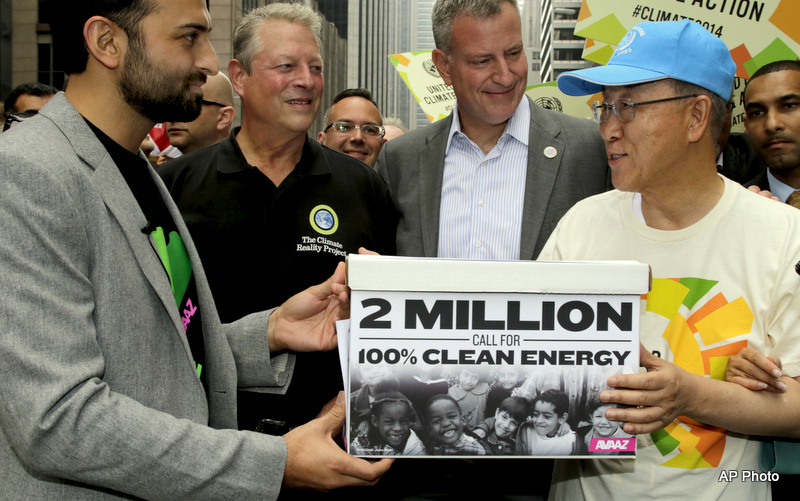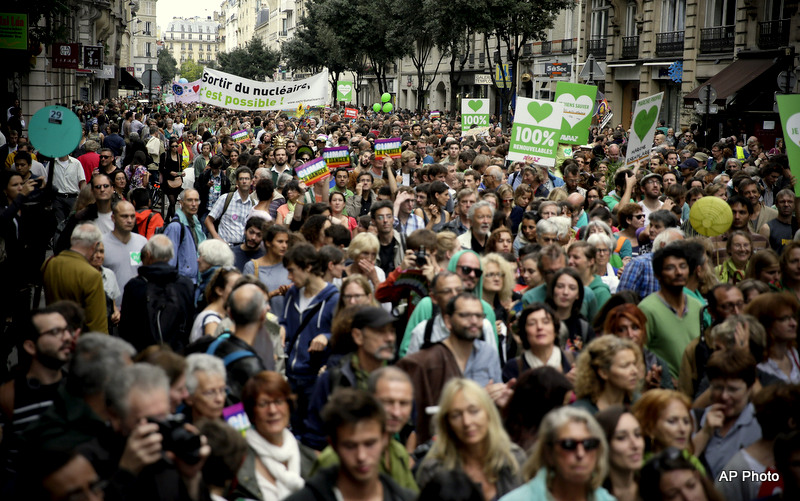Demonstrators make their way down Sixth Avenue in New York during the People’s Climate March Sunday, Sept. 21, 2014.S
The climate action weekend built around the People’s Climate March proved that the climate movement has broad popular support and millions are ready to mobilize. These are two ingredients necessary to achieve climate justice, but also needed is a strategy that is widely understood so people recognize their work is connected to a larger movement and their actions are more effective.
Governments are sold out to big corporate interests who profit from dirty energy and false market-based climate change “solutions.” Climate justice advocates must stop the government from doing more damage while creating new systems that allow us to stop participating in the dirty energy economy. A great power of social justice movements is noncompliance, but to not comply we need to be able to live in ways that are consistent with climate justice.
Thus, the climate justice movement needs to proceed on two paths at the same time. One is to stop government and big business from worsening the climate crisis. The other is to create new systems so people can disengage from the climate-catastrophe economy. Government and business have shown themselves incapable of responding to the climate crisis, making the second track particularly important.
The climate justice movement is already doing many of the things that need to be done. The purpose of this climate justice strategy is to build on those efforts, create synergy between our actions, make them more powerful and show people there is a plan for success.
Stop making climate problems worse

Government and big business are taking actions that need to be stopped by the climate movement. Tremendous damage will come from the corporate trade agreements that are designed to create massive profits for transnational corporations, especially from dirty energy.
Leaked chapters of the Trans Pacific Partnership show that its environmental standards are even worse than agreements negotiated by President George W. Bush and are unenforceable. The Transatlantic Trade and Investment Partnership will drive an increase in fracking and off-shore oil drilling in the United States for export to Europe. In addition, these agreements undermine the ability of communities to protect themselves because they give transnational corporations the legal power to sue governments if laws interfere with the profits corporations expect to make.
We can stop these trade agreements. For the past several years, a growing movement of movements which include food safety, health, environmental, worker rights, anti-imperialist and Internet freedom advocates, among others, has successfully prevented the passage of fast track trade promotion authority for President Obama. Fast track would allow the president to sign trade agreements with minimal Congressional review. Fast track’s failure in Congress has weakened U.S. negotiators, so smaller countries are empowered to stand up to U.S. trade negotiators who are pushing an extreme corporate agenda. If the climate justice movement makes stopping corporate trade agreements a priority, it will be the tipping point that will stop passage of these harmful agreements.
If we succeed in stopping corporate trade, it will be a tremendous victory over transnational corporate power. We can build on this victory to transform trade so that it serves people and the planet rather than the profits of global polluters. We will be building our power and taking power away from corporate interests.
Corporate trade is a huge global battle, but there are hundreds of battles we must fight at the local level as well. These include the expansion of tar sands mining, the increased use of trains to transport oil and coal, new pipeline infrastructure, offshore oil exploration and drilling, mountain-top removal for coal, hydraulic fracturing (fracking) for methane gas, and excavation for uranium as well as the development of new nuclear power plants.
A comment is needed on that last point. Some in the climate justice movement have remained silent or have even supported nuclear energy. Nuclear energy is too expensive and takes too long to come online. Nuclear power creates pollution nightmares from the excavation of uranium through processing and the radioactive waste that is produced. The limited time and money we have to make necessary changes would be better used to increase efficiency and develop clean, sustainable energy. The climate justice movement must recognize that nuclear power is a false, unnecessary “solution” and work toward a carbon-free, nuclear-free energy economy.
Another important issue that has not gotten enough attention is the U.S. military’s role in the emission of greenhouse gases. Carbon emissions from the military, the largest institutional carbon polluter on the planet, are not counted when the United States’ emissions are calculated by international bodies. The climate justice movement needs to speak out against war, not only because of its inherent evil, but also because it is very destructive to the planet.
Understanding that our issues are connected is essential for achieving climate justice. Imperialism and the global neoliberal economy are related to climate justice, and vice versa. When climate justice advocates join efforts to oppose expansion of wars and stop rigged corporate trade, and when those who work for peace and fair economies stand with climate justice advocates, we are all stronger. We can all work on the issues about which we are passionate but when we plan specific activities, if we cast a wide net and join together, it moves all of our work forward.
Creating the world we want to see

One of the most powerful weapons that civil society has is refusing to participate. Non-participation robs the status quo of its power. When people disengage from destructive economic and political systems, it weakens them. But how do we not participate when the society is built around carbon and nuclear fuels, capitalism and a mirage democracy? In order to do so, people need to build new systems and create new lifestyles that operate outside of current systems.
Instead of waiting for elected leaders and international bodies, we must take action outside of these bodies. This is already happening around many issues and in many places where new approaches are being tried. It’s important to understand that when we do this work we are connected to a global movement and for us to share what we are learning with each other.
Moving to a carbon-free nuclear-free energy existence can be achieved by making homes more energy efficient and reducing energy use. We can use public transportation or low consumption methods of individual transportation with electric cars, scooters and bikes. We can install windmills, solar panels and geothermal energy — either individually or with our neighbors through cooperatives — or push our local utilities to use renewables. Ideally, we will municipalize our energy utilities so that we withdraw support from Wall Street.
We can plant individual and community gardens, develop farmer’s markets, local food networks and compost our biodegradable waste. In Seattle, residents created a community food forest after years of meeting to decide what should be planted. We can stop using plastics and reduce our use of metals. We can fix things rather than throw them away and find new functions for used items.
We can build our local economies so that more of what we produce and use comes from our surroundings and supports our neighbors. Complementary currencies and cooperative or public financial institutions allow us to operate outside of the market system. We can rebuild the commons by expanding our public spaces and institutions and by sharing knowledge openly.
These are only a few suggestions. There are many people and communities doing amazing things. More powerful than individual action is community action. Talk to people in your community to find out what you can do together. These constructive programs are a key piece of nonviolent resistance.
A powerful next step for the climate justice movement would be to have an international day (or week) of activities in which communities could come together to decide how they can break from planet-polluting energy. Each community around the world can decide its own path toward the goal of reducing and ending dependence on carbon and nuclear fuels that is consistent with their conditions. In some, a community-based solar energy system will make sense, while others may develop wind. And still others will focus on decreasing waste and increasing efficiency or making bike lanes to decrease the use of automobiles.
The benefits of taking action together to achieve these goals are numerous:
- We learn from each other. Communities can report on the steps they are taking, the challenges being faced and their successes.
- We build community power as we take our future in our own hands, educate ourselves and connect with each other.
- Coordinated action sends a message to corporations and investors to follow the people and move their investments to clean energy.
- It sends a message to the government: If you want to be relevant, follow the people.
- Working together moves us quickly forward, not just as one community but as a global community acting locally.
Regular global days or weeks of action can be scheduled annually so communities keep moving toward efficient use of clean energy and creating other sustainable systems.
Many hands make light work
None of us can shoulder the responsibility of solving the climate crisis alone and no single solution will be adequate. We are building a mass “movement of movements” which understands the ways we are all connected and operates under a common strategy. Within that strategy, there are many tactics that work together synergistically.
The resistance parts of the work are crucial. Global neoliberal trade agreements that undermine sovereignty and democracy have been stopped before. We must stop them again or they will make our work more difficult. The expansion of the U.S. empire burns carbon and pollutes the planet while killing innocents and fomenting insecurity. It also squanders money which would do more societal good if used to build the green energy economy.
Brave resistance actions of all types are necessary to stop the march toward greater extraction and burning of fossil fuels. If they build it, it will be used and we must keep carbon in the ground to mitigate the climate crisis. Resistance actions are having an impact, making extreme extraction of energy less profitable and stopping projects.
But resistance alone will fail. If extreme energy extraction halts and there is nothing to fill the need for energy and other basic necessities, many people will suffer. We must build alternatives to fill the gaps. The success of alternative systems will draw people to them and make the current dysfunctional systems less relevant. As market demand decreases, dirty power plants will close.
There are many tasks, but if we act together strategically, we can do this. The climate crisis is an opportunity to think boldly and reshape our world so it is better than what we have now. We will build connections to each other, to our global community and to the Earth. We will create a society that is healthier for ourselves and for future generations. The power is in our hands when we link them in solidarity and refuse to leave anybody behind. This is our path forward and there are ways for everyone to travel on it.
Margaret Flowers and Kevin Zeese are organizers with Popular Resistance, which provides daily movement news and resources. Sign up for their daily newsletter and follow them on Twitter, @PopResistance.

